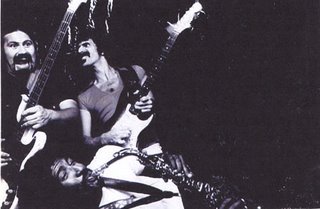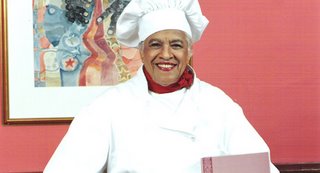So on Friday we had our big CD release show. You know, the one I’ve been hyping for about three months now.
I’m not going to mince words here. The experience was pretty disappointing for me. Oh, the group played beautifully (I’m convinced that these cats could pull musical inspiration out of a paper bag found in the street), and
the venue sounded amazing (there is just nothing to beat the sound of a big band at full blast in an acoustically strong hall), and we finally accomplished my longstanding goal of adding a dancer to the show (the brave and amazing Valerie). Plus, we began to realize the more “theatrical,” dada-carnival conception of the IJG. And, hope against hope: a bunch of people in the audience actually wore costumes. So all the elements were present for an evening that would be memorable for all the right reasons.
But the performance was seriously compromised by a low turnout. Now, I wasn’t so clueless that I expected to fill the place (which seats around 300), but given that it was a Friday night, at 8 PM, in our home town, and given that we got a good (even intriguing) writeup in the
Weekly, and given that we did a whole lot of other promotion (including grass roots promotion by everyone in the group -- you do the math), I did expect -- indeed, I think we deserved -- to have at least a hundred people get off their asses and check it out. We got maybe half that many.
On a “school night,” I’d be less bothered by such a thing. But on a Friday? At 8 PM? At a beautiful venue with plenty of free parking? I’m perplexed.What does it take to get people to come out and hear live music in this town? Is it not enough to have stellar musicians, unique compositions, singing, dancing, drama, and comedy? Do I need to throw
hookers and cocaine into the mix too?
Is $10 too much to charge for two hours of live entertainment? I’m not convinced. I know people often drop more than that (especially when you add in the price of a bucket of popcorn) to go see a movie. And movie-going often doesn’t seem to be driven by any burning desire to see a specific film, but rather by a vague motivation to “go out.” Why are people less willing to take the same risk with live music? Maybe
Glenn Gould was right, and the latter really is becoming an antiquated art form?
Do people just assume that a band like this will always be here, and that they can just catch us “the next time” (
or the time after that, or the time after that…)? Do they expect that we’re satisfied with doing this sort of thing as a hobby? Do they lack any conception of the amount of work or the number of sacrifices that go into creating a show like this (work done and sacrifices made by everyone involved)? Do they even know what they’re missing? Or (worse still) is the problem deeper than all of these things put together?
Look, LA people have been bugging us to perform here on a weekend for a long time; the last local weekend show we did may have been as far back as 2003. So that adds to my bafflement. In fact, a month or two ago I had an email conversation with a few of the other guys in the group in which we were brainstorming strategies to bring the IJG to the “next level” economically, and at one point I argued as follows:
“In the case of LA, I suspect that more people would come out to see us here if we played weekend evenings instead of ‘school nights.’ At least the fans I know personally have told me this. It seems to be an unwritten rule: people just don’t come out to hear live non-pop music on weekday evenings in LA. I was astounded at the paltry audience that turned out to see
Billy Childs, and him with LA Times coverage and a fucking grammy, for chrissakes [Childs played an Alternajazz triple bill with us on a Sunday back in February].
Jim Carney (who had prestige and honors to burn) had the same problem, sometimes even when he did play the [Jazz] Bakery. It’s one of the things about this town that drove him away. (Think too about the
late Monday Evening series at LACMA: did you ever see more than 25 people there?)”
“If we don’t get a good turnout on April 21, then I’ll need to revisit this theory.”
Okay, so obviously, I need to revisit this theory. My new theory? It’s the “deeper problem” I hinted at above: LA doesn’t give a fuck about new or interesting music.
Disagree, LA? Prove me wrong, then.
Don’t misunderstand me: I am not throwing in the towel when it comes to cracking the mystery of producing a successful LA gig. I know there is a core group of local people who come to our shows on a rotating basis (thank you all), and I know there are others who have every intention of coming to a show soon, but haven't been able to because of life issues (a new kid, for example). But in a city this big, it is just statistically impossible that there aren’t more like-minded music fans out there. So this is not so much about hounding specific people to come and hear us; rather, I’m calling out a particular (and lethal) quality of LA “cultural life” (or what passes for it).
In any case, I’m not ready to follow my friend Jim Carney to NYC (yet), though time may reveal that he made the wiser choice. No, I’m not throwing in the towel -- I’m throwing down the gauntlet. LA likes to think of itself as a cultural tastemaker, and as a result, tends to think that it actually has good taste. (Isn’t that sort of backwards?) Again, I say: prove it. Demonstrate that you can live up to the hype, and that (to embellish an old cliche) you’re not so in love with the box that you can’t imagine anything outside of it. Otherwise, chances are good that there won’t be any community of live, acoustic performance at all in LA when the Big One hits; and what are you going to do for entertainment then?













